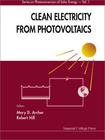清洁的光电能/CLEAN ELECTRICITY FROM PHOTOVOLTAICS
2001-12
Pengiun Group (USA)
Archer, Mary D. (EDT)/ Hill, Robert (EDT)
844
Photovoltaic cells provide clean, reversible electrical power from the sun.Made from semiconductors, they are durable, silent in operation and free of polluting emissions. In this book, experts from all sectors of the PV community- materials scientists, physicists, production engineers, economists and environmentalists -- give their critical appraisals of where the technology is now and what its prospects are.作者简介:MARY ARCHER is a Visiting Professor in the Centre for Energy Policy and Technology at Imperial College,London, a Bye-Fellow of Newnham College,Cambridge, and a ompanion of the Institute of Energy. Her long-standing interest in direct (non-thermal) means of solar energy conversion was sparked by the oil price hikes of the 1970s. At Imperial College (1966-68), the Royal Institution,London (1972-76), and the Department of Chemistry, Cambridge University (1976-86), she worked on terogeneous catalysis, photogalvanic cells, electron transfer and semiconductorphotoelectrochemistry. Since leaving full-time academia, she has served on a number of energy policy advisory bodies, including the Department of Energy's Renewable Energy Advisory Group and the DTI's Energy Advisory Panel. She co-founded the UK Solar Energy Society in the early seventies,and is now its President, and she was the founder Chairman and is now President of the National Energy Foundation, which promotes energy efficiency and renewable energy.
About the authorsPreface1 The past and present M. D. Archer 1.1 Milestones in photovoltaic technology 1.2 Evolution of the PV market 1.3 Overview ofphotovoltaic cell operation 1.4 Other junction types 1.5 Sources of further information2 Device physics of silicon solar cells J. O. Schumacher and W. Wettling 2.1 Introduction 2.2 Semiconductor device equations 2.3 The p-n junction model of Shockley 2.4 Real diode characteristics 2.5 Numerical solar cell modelling 2.6 Concluding remarks3 Principles of cell design J. Poortmans, J. Nijs and R. Mertens 3.1 Introduction 3.2 Main cell types 3.3 Optical design of ceils 3.4 Surface recombination losses and their reduction 3.5 Bulk recombination losses and their reduction 3.6 Design and fabrication of the metal contacts 3.7 Conclusions4 Crystalline silicon solar cells M. A. Green 4.1 Overview 4.2 Silicon cell development 4.3 Substrate production 4.4 Cell processing 4.5 Cell costs 4.6 Opportunities for improvement 4.7 Silicon-supported thin films 4.8 Summary5 Amorphous silicon solar cells C. R. Wronski and D. E. Carlson 5.1 Introduction 5.2 Background 5.3 Amorphous silicon-based materials 5.4 Growth and microstructure 5.5 Solar cells 5.6 Solar cell structures 5.7 PV modules 5.8 Manufacturing costs 5.9 Long-term reliability 5.10 Environmental issues 5.11 Challenges for the future6 Cadmium telluride solar cells D. Bonnet 6.1 Introduction 6.2 Early work 6.3 The potential of the base material 6.4 Diodes and cells 6.5 Cell production 6.6 Module production 6.7 Industrial status--achievements and projections 6.8 Economic aspects 6.9 Health and environmental aspects 6.10 Conclusions7 Cu(In,Ga)Sezsolar cells U. Rau and H. W. Schock 7.1 Introduction……8 Super-high efficiency Ⅲ-Ⅴ tandem and multijunction cells M.Yamaguchi9 Organic photovoltaic devices J.JM.Halls and R.H.Friend10 Quantum well solar cells J.Nelson11 ThermophotovoItaic generation of electricity T.J.Cortts12 Concentrator cells and systems A.Lugue13 Cells and systems for space applications C.M.Hardingham14 Storage of electrical energy R.M.Dell15 Photovoltaic modules,systems and applications N.M.Pearsall and R.Hill16 The photovoltaic business:manufacturers and markets B.McNelis17 The economics of photovoltaic technologies D.Anderson18 The ortlook for PV in the 21st century E.H.Lysen and B.YordiAppendicesIndex

清洁的光电能/CLEAN ELECTRICITY FROM PHOTOVOLTAICS PDF格式下载